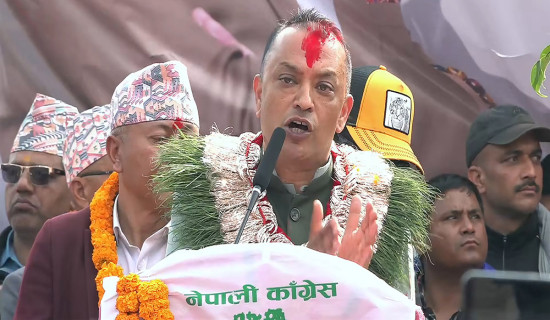- Thursday, 26 February 2026
Typical Communist Character
Dr. Chuda Prasad Dhakal
Understanding the essence of true communist character requires studying the theories of Karl Marx and Friedrich Engels, the historical writings and lives of Lenin, Stalin, and Mao Zedong. Similarly, in modern times, the leadership of Xi Jinping, Fidel Castro, and Kim II Sung presents contemporary interpretations of these ideals.
In Nepal, the experiences and actions of leaders like Pushpa Lal Shrestha, Madan Bhandari, Manmohan Adhikari, Pushpa Kamal Dahal Prachanda, Mohan Bikram Singh and Nirmal Lama also provide valuable lessons. Collectively, these diverse sources depict the complexities and expectations of communist leadership.
True communist character is based on integrity, dedication to the working class, and unwavering commitment to ideological purity. Historical figures like Lenin and Mao exemplified these traits, pursuing their revolutionary goals relentlessly and willing to sacrifice personal gains for the greater good. They led by example, often living austere lives and staying close to the working class. Xi Jinping has maintained ideological integrity within the party through his anti-corruption campaigns and emphasis on discipline, presenting a modern example of true communist character.
The early journey of Prachanda symbolised hope and change. However, his leadership was weakened by deviations, corruption, and allegations of nepotism. "The Rise and Fall of Rebel Leader Prachanda" (Nepal Live Today, October 24, 2021, by Nishan Khatiwada) depicts Prachanda's life journey and his downfall, serving as a cautionary tale. Similarly, the contributions of Madan Bhandari and Manmohan Adhikari have also shaped Nepal's communist movement, highlighting different aspects of the communist character.
In China, Xi's leadership serves as a modern example of maintaining ideological integrity. Likewise, Castro's perseverance in Cuba, based on his unwavering commitment to socialist principles despite external pressures and challenges, is notable. Kim Jong-Un's leadership in North Korea also demonstrates strict adherence to communist ideology.
True communist character is not limited to prominent leaders. It is a collective ideal that every member of the movement must embrace. For the ordinary person, this means living a simple life, prioritising community welfare over personal gain, and actively participating in the collective struggle for social justice. This includes efforts at grassroots activism, educational initiatives, or other forms of civic engagement, consciously aligning their activities with the broader goals of the movement.
The experiences of Nepal, along with broader global examples, underscore the importance of following these principles. When leaders and members prioritise ideological purity and collective welfare, the movement thrives. "Off the Prachanda Path: Nepali Communists' Crisis of Legitimacy" (The China Story, 2020 by Bhairav Risal) shows how personal ambition and opportunism weaken the movement.
By learning from historical and contemporary examples and adopting these principles in daily life, individuals and leaders alike can contribute to building a just and equitable society. The rise and fall of leaders like Prachanda remind us of the dangers of deviation and the enduring power of true revolutionary ideals. By doing so, they can help build a future that truly embodies the principles of equality, justice, and collective well-being.
















